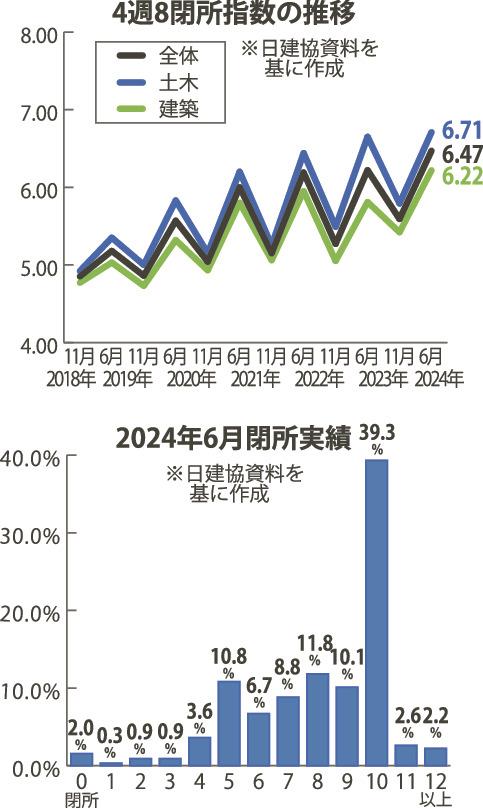On the 17th, the Japan Construction Industry Employees' Union Council (Nikkenkyo, chaired by Shusaku Kinami) announced the results of the "Step Up Campaign" held in June 2024 to close buildings for 4 weeks and 8 days. The 4-week-8-week closure index, which adjusts the average number of closed days at the workplaces responded to for comparison with other months, was 6.47 days, up 0.25 days from the same period last year. The average number of closed days was 8.08 days, both of which were the highest values since the survey began in November 2018. On the other hand, according to the affiliated union, the gap between the highest and lowest prices was about 3.1 days, up from 2.4 days in the previous survey (November 2011), and polarization among companies began to emerge due to the Saturday closure.

Of the 35 member unions, 31 unions and 3,992 workplaces nationwide participated in the survey. The closed space index for each civil construction site hit a record high, with 6.71 days for civil construction (up 0.06 days from the same period last year) and 6.22 days for construction (up 0.41 days from the same period last year). . Jkenkyo said, ``Efforts to improve overtime ceiling regulations to be implemented in April have been demonstrated. The foundation for starting new construction has become easier in negotiations with customers, and both the civil and construction sectors are progressing smoothly.'' And so on.
Looking at the distribution of days of closure, 44.1% of facilities were closed for 10 days or more, meaning they were closed on all Saturdays and Sundays in June. The proportion of spaces closed for 5 days or less was 14.3% for civil engineering, while 22.7% for construction, and the Japan Kenkyo Association pointed out that ``construction is still an environment less likely to be closed'' and that such measures need to be taken.
The average number of closed days, calculated by dividing the total number of closed locations per month by the number of workplaces, was 8.08 days, the highest ever. The closed space index for each affiliated association was the highest at 7.21 days and the lowest at 4.11 days. The ratio of all workplaces with 8 or more closed spaces was the highest at 83.9% and the lowest at 14.3%. The ratio of closed locations with 10 or more was the highest at 65.8% and the lowest at 14.3%. Despite an overall improvement trend, ``the results of efforts by unions and companies to close workplaces on Saturdays have led to polarization'' (Nikkenkyo).
Regarding construction work that requires little enclosed space and customers, the list includes construction work related to the Osaka/Kansai Expo, private housing, and public interest private companies. Some of the challenges cited include tight order deadlines, low staff numbers, and maintaining wages for craftsmen. There were 81 workplaces that were closed for 0 days, but President Kinami admitted that the closures were mainly due to disaster recovery and that ``this is to fulfill the mission of the construction industry to protect social infrastructure, so we can't do anything but do it'' (President Kinami) Ta. At sites where there are rare closed areas, employees take turns taking leave to cope with the situation.
Invite partners to watch the activities of Pacific Group Co., Ltd.
FanPage: https://www.facebook.com/Pacific-Group
YouTube: https://www.youtube.com/@PacificGroupCoLt






